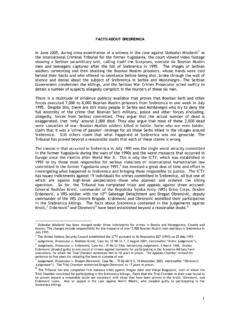Transcription of BRITISH SERIAL KILLING: TOWARDS A …
1 The BRITISH Criminology Conferences: Selected Proceedings. Volume 2. Papers from the BRITISH Criminology Conference, Queens University, Belfast, 15-19 July 1997. This volume published March 1999. Editor: Mike Brogden. ISSN 1464-4088. See end of file for copyright and other information. BRITISH SERIAL killing : TOWARDS A STRUCTURAL EXPLANATION Chris Grover and Keith Soothill Leyton (1986) argues that in order to understand the phenomenon of SERIAL killing factors beyond the psychological tradition need to be analysed. His structural account using evidence of American SERIAL killing and focusing on socio-economic factors provides a powerful contribution to a neglected area.
2 How applicable, though, is Leyton's thesis of 'homicidal protest' to the BRITISH experience of SERIAL killing ? In focusing on known BRITISH SERIAL killers since the 1960s, our results suggest that Leyton's work cannot be wholly applied to the modern BRITISH experience. While finding Leyton's analysis both limited and limiting, we support the general approach. However, we argue that the focus should be widened to include other social relations, such as patriarchy. Introduction Popular, academic and control agency interest in SERIAL killing has mushroomed over the last decade.
3 SERIAL killing has become big business, with various state and private interests having vested reasons for keeping SERIAL killing in the news. Soothill (1993), for example, argues that SERIAL killing as an industry has important implications for the revenue of business interests as diverse as film making and publishing through to those corporations involved in the development of police computer hard and software. Whilst such interests exist, often blurring the boundaries between fictional (or 'factional') representations and the reality of SERIAL killing , there are real concerns about the detection and capture of SERIAL killers.
4 In the USA, for example, Caputi (1987: 1-2) quotes FBI statistics to show how SERIAL murders had increased dramatically over two decades, 'there were 644 such murders in 1966 and an estimated 4,118 in 1982, comprising nearly eighteen per cent of all murders that year'. In the United Kingdom the figures highlight a different type of problem. The recent media interest in SERIAL killing is seriously disproportionate to the scale of the problem. Nevertheless, we should not underrate the very real concerns that a spate of SERIAL killing sets off in a community.
5 Indeed, our task is not to deny the importance of the concern, but to challenge the nature of much of the focus. In brief, some questions are being highlighted while perhaps even more important questions are being neglected. A fundamental distinction is between individual and structural approaches. Certainly the developments in recent years of attempts to 'combat' such offences - psychological profiling, DNA testing and offender databases - are necessarily linked to the offender as individual, with the primary focus in trying to develop psychological profiles through offender profiling or biological profiles through DNA testing.
6 In essence, these reflect laudable attempts to improve detection. The focus of detection is upon the individual. However, a problem emerges when the discourse of detection subtly shifts to become the discourse of causation with the suggestion that SERIAL killing is the result of factors located within an individual, whereby a psychological, psychiatric, or biological predisposition to murder is sought. While seeking an explanation within such frameworks is perfectly proper, arguments that the genesis of crime might be more fully explained by considering wider social structures tends to be excluded.
7 The present 'crime' in terms of explanation is not one of commission - everyone is entitled to proffer an explanation - but one of omission - some explanatory frameworks are rarely exposed. We argue that the dominant individualistic discourse fails to meet the challenge of causation satisfactorily and there is a need to consider explanatory frameworks which are more ambitious in their scope. Certainly the main result of the psychologising and medicalising of the causes of crime is that the historical and cultural specificity of crime is ignored.
8 These are ignored at our peril. Without a focus upon wider social factors in causing offender behaviour, any understanding of crime cannot be complete. Current limitations of analysis It is curious that recent sociology which concerns itself with the social origins of crime tends to ignore more serious, albeit more rare, crimes of violence against the person.[1] Acts which tend to be portrayed as individual manifestations of evil would not have deterred one of the founders of sociology, Emile Durkheim, from confronting an analysis.
9 Indeed, his very choice of focusing on suicide as a demonstration of the importance of social analysis was because suicide was regarded as a very personal and individualistic act (Durkheim, 1952). The second concern is that - with the demise of most avowedly Marxist approaches (whether intellectually justified or not) - the alternative (which now seems a consensus among the main political parties) provides little scope for fundamental change. It is our contention that the mere tweaking of the socio-economic system is not enough to overcome all variants of crime.
10 We need to consider whether it is the very nature of society which 'creates' those people we have come to know as ' SERIAL killers'. An exception to the limitations of much recent sociological analysis is the work of Elliot Leyton who usually describes himself as a social anthropologist. In brief, his work (Leyton, 1986) on multiple murder provides the opportunity to appreciate that SERIAL killers may be socially constituted. Leyton's work on the experience suggests the acts of SERIAL killers are not simply the result of a deranged or dangerous personality, but, more importantly, may be the consequence of a socio-economic system which cannot by its rabidly competitive dynamic reward the efforts of all, and may dangerously marginalise certain people.










